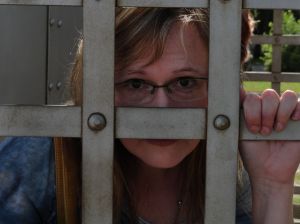It was one of the great livery-stableman’s most masterly intuitions to have discovered that Americans want to get away from amusement even more quickly than they want to get to it.
Edith Wharton, Age of Innocence
It’s not that we wanted to get away from the amusement. It’s that we wanted to get away from the crowds getting away from the amusement.
My friend Angie and I took our girls to the Laura Ingalls Wilder Pageant in Walnut Grove. After touring a wonderful museum center, we drove into the country and parked in a grassy field with hundreds of other cars. This was the site of an outdoor play about Laura’s life and Walnut Grove’s roots.
The play ran from 9 p.m. to 11 p.m., and after that, we had a two-hour drive. Angie said, the last time I was here, it took one hour just to get out of the parking lot.
Sure, we’d paid for the tickets. And we faced a long drive with tired kids regardless, so what’s another hour?
Sixty minutes to be exact — an hour of honking horns as drivers rush the exit. It’d be 20-year-old trucks and minivans against my cute new car, only 7,000 miles old.
Maybe we should leave early, I said. It’s not like we don’t know the story’s ending.
Right, she said.
I vacillated. It was our day for Laura Ingalls, my daughter’s first beloved heroine. Mine, too. It’s Laura from the Banks of Plum Creek, not Laura of Silver Lake or Laura of those Happy Golden Years. Plum Creek Laura is our favorite, a book with an action-filled plot and fun cast. The bratty Nellie Oleson, the dugout, Johnny Johnson, the country party vs. the city party.
Also, Angie and I are writers. Exploring Laura’s town was our study in setting and character.
I shivered and said, it’s really cold for July. Maybe we should leave early because of the parking lot and all.
So Angie and I calculated reasons:
- It was cold, but not cold enough to kill pesky mosquitos.
- The seats were uncomfortable.
- The drive would be late, dark and long.
- The bathrooms were gross.
- The kids were tired.
Bingo! The kids. That settled it. We’d leave early. Our poor kids!
After intermission, during scene seven, we gathered our stuff, slipped between the seats, and dashed for the car. We were out of the field and on the road before the applause.
The girls settled in with their electronic gadgets. Angie and I chatted. We chatted about the Ingalls family, about Angie’s new novel, about my new novel, about OHMYGOD DEER IN THE ROAD.
Four screams, a thunk, a deer rolling over the windshield, rolling over the hood of the car, and disappearing in the ditch.
All passengers were fine. The car’s front was mutilated and the top smeared with blood and (sorry) deer poop. We eventually made it to Angie’s house and collapsed into nervous slumber.
So, Edith Wharton, you made a poignant reflection about our culture when you wrote Americans are more eager to leave their amusement than they are to get to it.
But why?
Is it really about cold seats and mosquitos?
Is it because we feel guilty? Because people suffer around the world while Americans enjoy demolition derbies; pizza buffets; carnival games with junk prizes, like those big purple teddy bears; and TV shows about swearing, smutty housewives?
Because our country is such a vat of amusement, we’ve developed the attention span of a gnat?
Because we’re so arrogant that each and every one of us believe we deserve the first shot out of the parking lot? Our lives are so important we couldn’t possibly wait one hour?
I’m not drawing a lame karmic connection between a deer crash and being a jerk, although the deer probably thinks I should.
I simply want to understand why Angie and I decided to flee an event we’d been planning for months. We’ve both survived uncomfortable chairs and mosquitos and disgusting bathrooms – often in our own homes.
So I leave the laptop today with a nod to pageant patrons who enjoyed the show’s final two scenes and withstood the parking chaos. Kudos to them for living the moment while they were in the moment.
Maybe I’ll try that next time. For Edith and for Laura.




